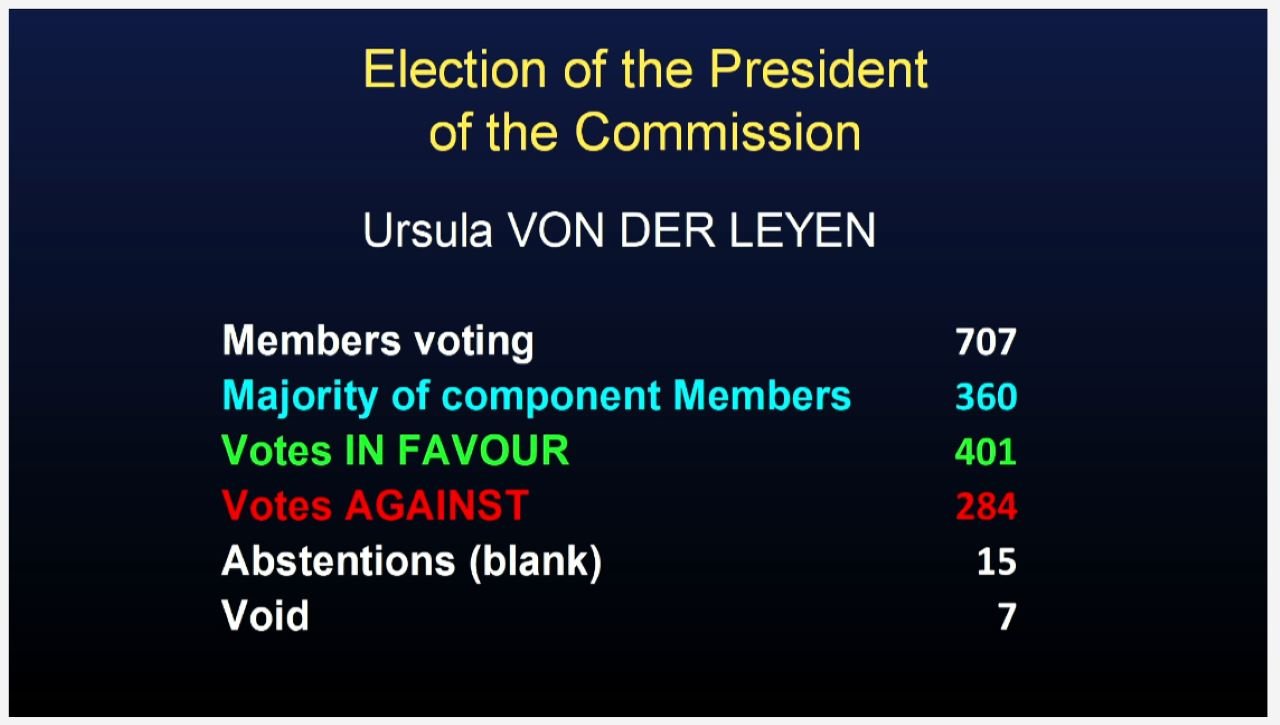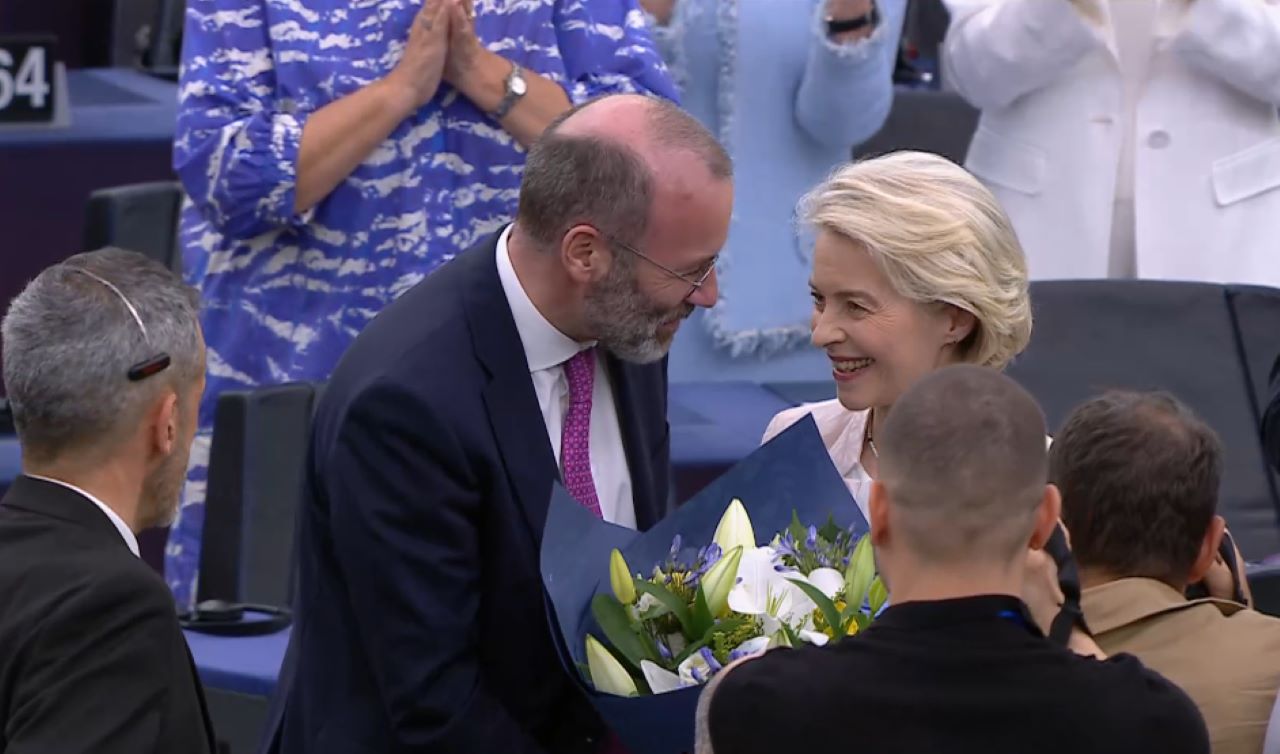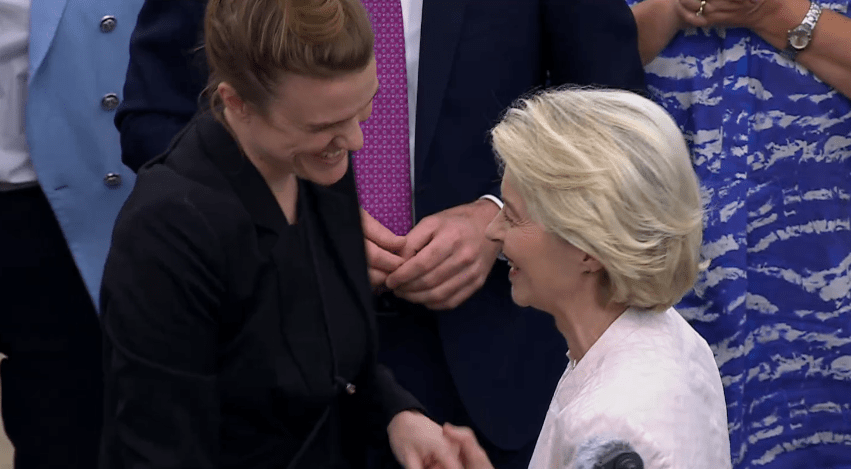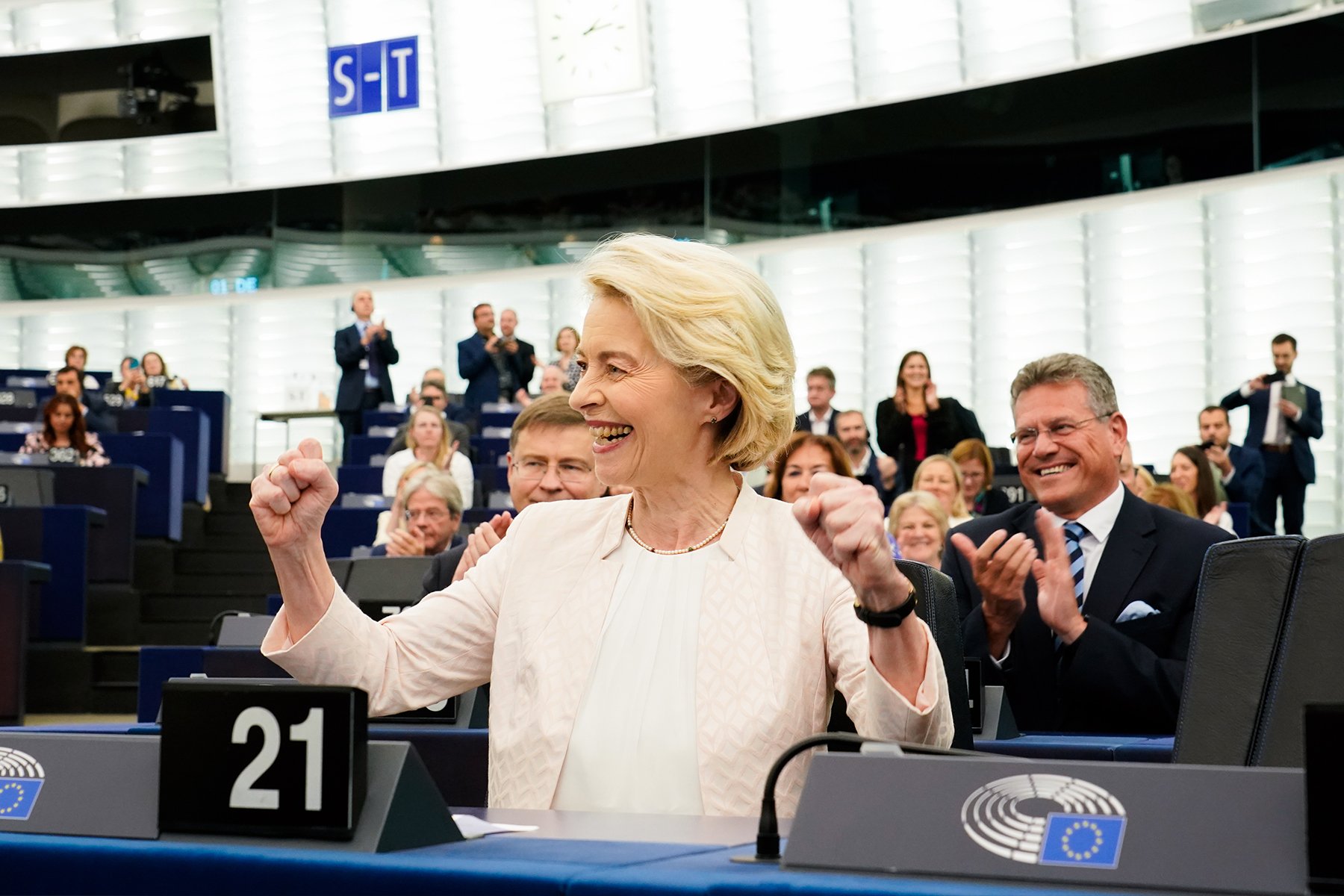With 401 votes in favour, the European Parliament elected Ursula von der Leyen as President of the European Commission in a secret ballot on 18 July.
This will be Ursula von der Leyen’s second term as Commission President. She was first elected by MEPs in July 2019.
Parliament is currently composed of 719 MEPs, so the necessary majority was 360 votes. The vote was held by secret paper ballot. 401 MEPs voted in favour, 284 against, and 22 cast blank or invalid votes.

Ahead of the vote, Ursula von der Leyen presented her political priorities for the next five years during a debate with MEPs.
Congratulations: Manfred Weber, EPP/CSU

Congratulations: Terry Reintke, Greens/EFA

Next steps
The Commission President-elect will now send official letters to member state heads of state or government inviting them to put forward their candidates for European Commissioner posts. Parliament will then organise nominee hearings in the relevant committees after the summer. The full college of Commissioners then needs to be endorsed by Parliament. More information is available in Parliament’s press kit.
Background
Article 14 of the Treaty of the European Union provides that the EP “shall elect the President of the Commission.” Ursula von der Leyen has been Commission President since 2019 and was the EPP’s lead candidate in the 6 – 9 June European elections.
Further information
Election of the President of the European Commission
The election of the Commission President will take place after Parliament has constituted itself. The final decision on the precise calendar will be taken by the Conference of Presidents of political groups.
Article 14 of the Treaty of the European Union provides that the EP “shall elect the President of the Commission.” In practice, based on the rule 128 of the Rules of Procedure, the candidate proposed by the European Council will present their political guidelines to Parliament, followed by a debate. Parliament will elect the President of the Commission by a majority of its component MEPs (361, in a Parliament of 720 Members). The vote is by secret ballot.
If the candidate does not obtain the required majority, the President shall invite the European Council to propose a new candidate within one month for election in accordance with the same procedure.
Hearings with the Commissioners-designate
Under current procedures, together with the (newly) elected Commission President, the Council appoints the Commissioners-designate. Each Commissioner-designate is assigned responsibility for a specific policy area by the Commission President. The relevant EP committees assess each of the Commissioners-designate, before a plenary vote on the appointment of the College as a whole.
Examination by the Committee on Legal Affairs of the declaration of interests
The Committee on Legal Affairs carries out a full examination of the declaration on financial interests of the Commissioners-designate – ahead of their committee hearings – in order to assess accurate and complete content as well as possible conflicts of interest.
Should the Legal Affairs Committee have any doubts, it can ask for supplementary information or invite the Commissioner-designate for a discussion. It can also issue recommendations for resolving a conflict of interest.
Before the hearings with the relevant committees can take place, the Legal Affairs Committee must confirm in writing the absence of any conflict of interest. If no solution is found for a given conflict of interest, the Legal Affairs Committee will conclude that the Commissioner-designate is unable to exercise their function.
Written procedure: questions from MEPs
The Commissioner-designate has to provide written replies to several questions, including some from MEPs in the committees responsible for the portfolio to which they have been assigned. A first block of questions revolves around their general competence, European commitment and personal independence, the management of the portfolio and planned cooperation with Parliament. The specialist committees prepare a series of specific questions on the portfolio.
The CVs of all Commissioners-designate and their reply to the written questions will be published on the EP website ahead of the hearings.
Hearing in the relevant committee or committees
The Commissioner-designate is invited to a three-hour hearing, streamed live, in front of the EP committees responsible for their portfolio. The candidate makes an opening speech of maximum 15 minutes and will then reply to MEP questions.
Evaluation after the committee hearing
The responsible committee or committees must finalise their evaluation of a Commissioner-designate within 24 hours following the hearing and should meet in camera “as soon as possible” for that purpose. The committee(s) in charge of the hearing can also ask the Commissioner-designate for more information in writing, or organise a shorter additional hearing. An evaluation letter for each candidate is prepared by the political group coordinators, stating whether a candidate is qualified both:
- to be a “Member of the College” (the European Commission) and
- to carry out their assigned duties.
This letter is then transmitted for examination to the Conference of Committee Chairs (CCC) within 24 hours after the completion of the evaluation. If the CCC approves the letter, it is sent confidentially to the Conference of Presidents. A separate evaluation report on each Commissioner-designate is sent to the Conference of Committee Chairs and to the Conference of Presidents of the EP, which will draw up a draft resolution to be voted on in plenary.
Conclusion of the hearing process
The Conference of Presidents declares the hearings closed after having analysed the evaluation letters from the Committees in charge and the recommendation of the Conference of Committee Chairs (CCC). Only at this point can the evaluation letters be published and comments on the evaluation be made.
Plenary vote of investiture
The Commission President takes the results of the hearings, as well as consultations with Parliament’s political groups, into account. They then presents their team and political priorities during a plenary session. After a debate, MEPs will decide, by a majority of votes cast, whether to invest the new College of Commissioners for a mandate of five years.
Pending legislative proposals
Not all negotiations between EU co-legislators (Parliament and Council) on proposals tabled by the European Commission were concluded by the end of the ninth legislative term. This can happen for several reasons, for example when no agreement could be reached in interinstitutional negotiations, or when national governments are unable to agree on a common position.
In concrete terms, legislative files
- that were adopted by Parliament in plenary before the elections, whether at first reading or second reading, or under the consultation procedure, will remain legally valid for the next Parliament.
- Examples include combatting late payments, the revision of payment services, food and textile waste, water pollutants, new genomic techniques, safety of toys, driving licenses, Single European Sky, pharmaceuticalsand the revamp of the EU Customs code.
- that did not reach the plenary before the elections, saw the work done on them (in committee, trilogue if there was not a deal) end. However, the new Parliament could decide to continue this work.
- Examples include combatting corruption, retail investor protection, Digital Euro, AI liability, combatting sexual abuse of children, long-term residents, the anti-smuggling package, animal transportand welfare of cats and dogs.
At the beginning of the new parliamentary term, Parliament’s Conference of Presidents (EP President and political group leaders) will decide on the basis of input from parliamentary committees, whether to continue working on “unfinished business” (Rule 250 of the EP’s Rules of Procedure).
Once they take this decision (possibly in October 2024), it will subsequently be announced in plenary (possibly also in October 2024).
If the Conference of Presidents and plenary decide to take forward this work, the newly elected Parliament will continue with the next stage of the relevant decision-making procedure.
If needed, a new rapporteur will be appointed.
Traditionally, the Conference of Presidents decides to resume all unfinished legislative work. Exceptions can be made, for instance for files that have become obsolete and on which a new proposal by the Commission or renewed consultation by the Council is expected.
Find here a list of pending legislative files for the tenth legislative term (non-exhaustive).
Further information

